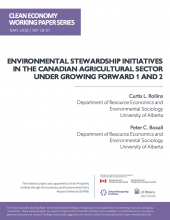May 15, 2018
Since 2003, Canadian agricultural policy has been driven by a series of five-year Agricultural Policy Frameworks (APF). Environmental stewardship programming, which largely relies on subsidizing the adoption of on-farm beneficial management practices (BMPs) to achieve environmental goals, has been a major component of each framework and the primary means under which provincial and federal governments address environmental issues in the agricultural sector. Upon the completion of the first APF, simply referred to as the APF, the Auditor General of Canada criticized the program for failing to measure the efficiency and efficacy of agri-environmental cost-share programs. Over the course of the two following APFs, named Growing Forward 1 (2008-2013) and Growing Forward 2 (2013-2018), little publically available evidence can be found that these concerns raised by the Auditor General with respect to program evaluation were addressed. Using limited available data, this report outlines an attempt at evaluating the performance of environmental stewardship subsidies in Alberta. We present rudimentary evaluation results and emphasize shortcomings in current data availability in order to provide data collection recommendations for evaluating the next APF, the Canadian Agricultural Partnership, which will run from 2018-2023.
Authors:
Curtis L. Rollins, University of Alberta
Peter C. Boxall, University of Alberta
A version of this paper has been published in the Canadian Journal of Agricultural Economics 66 (2018) 171–186.
The Clean Economy Working Paper Series disseminates findings of ongoing environmental and clean economy work conducted by researchers from a range of disciplines. These working papers are meant to make results of relevant scholarly work available in a preliminary form. Although these papers have not undergone a peer-review process, they meet general standards of scholarly excellence. The views expressed in these working papers are those of the authors and do not necessarily reflect the opinions of Smart Prosperity Institute.



